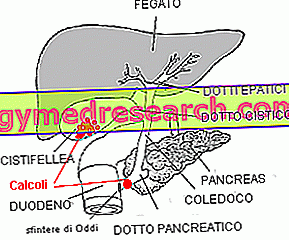The list of tests to undergo during pregnancy is quite substantial, but essential for ascertaining the health of the fetus and suggesting to the pregnant woman a personalized series of hygienic-behavioral rules, important for the success of the pregnancy itself.
Ticket exemption

NOTE: in the case specific conditions require it, as in the presence of pregnancies at risk, the exemption from the ticket can also be extended to some exams normally paid. Regarding all those advisable but not free surveys, it is up to the specialist to suggest opportunities and timing, according to the criteria established by the various organizations to which it refers.
First-time examinations
To be carried out by the 13th week of pregnancy
| Blood exam completed | Examination conducted on a small blood sample, in order to assess the concentration of its cellular component - otherwise called corpusculate - made up of red blood cells, white blood cells and platelets. This analysis is therefore important to establish whether there are abnormalities in the blood cells. The survey is exempt from the ticket. |
| transaminases | GOT and SGPT (AST and ALT) are enzymes produced by liver cells; consequently they increase their concentration in the blood in the presence of liver damage. The exam is exempt from the ticket. |
| Urinalysis | It is used to assess kidney function, liver health, but also the possible presence of diabetes, gestosis or preeclampsia and urinary tract infections. The exam is exempt from the ticket. |
| Glycemia | A rather common investigation that allows to highlight any diabetic or prediabetic states; the latter tend to be aggravated by pregnancy (see the article on gestational diabetes). In women at risk of diabetes, therefore, it is usual to carry out the so-called glucose loading minicurva (blood glucose after oral intake of an aqueous solution of 50g of glucose). The exam is exempt from the ticket. |
| VDRL, TPHA - RPR | Serological tests for the diagnosis of syphilis, a bacterial disease that is transmitted mainly by sexual means or vertically, ie from the infected mother to the fetus. The exam is exempt from the ticket. |
| Antibodies against Toxoplasmosis and rubella | The respective IgG and IgM antibodies are evaluated. If the IgG are positive it means that the pregnant woman can stay calm, having already contracted the disease. If both are negative, appropriate preventive measures must be put in place to avoid contagion during pregnancy (for toxoplasmosis, wash your hands well before eating, wash the vegetables very well, do not eat raw or cured meat and respect all the general rules in this article). If the IgM are high it means that the infection is recent or ongoing; further investigations are therefore necessary to ascertain the absence of dangers for the fetus. If you know of a previous infection, the analysis can be avoided by showing appropriate documentation. In the presence of IgG and negative IgM the analysis should be repeated every month until delivery. During this phase of pregnancy, the exam is exempt from the ticket. |
| Blood group and Rh factor, indirect Coombs test | All these tests are used to verify the possible incompatibility between maternal and fetal blood; for this purpose it is necessary to know also the blood type and the Rh factor of the father. Both exams, exempt tickets, can be skipped if the appropriate documentation is already present on the health card. In the case of Rh negative women, or at least at risk of immunization, the test must be repeated every month. In cases of AB0 incompatibility risk (group A, B or AB father and mother 0), the exam is useful around the 28th week, and should be repeated at the 34th-36th week of gestation. |
| HIV test | Antibodies are sought against the homonymous virus or its antigens. HIV is transmitted by sexual means, transfusions or other contact of one's blood with the infected one (syringes), or even vertically, that is from the infected mother to the fetus. |
| Obstetric ultrasound | Using ultrasounds, completely harmless for both the mother and the fetus, the state of health of the fetus is assessed. In particular, the first obstetric ultrasound examines the dating, location, number and vitality of embryos. |
| Note | If the age of the pregnant woman is more than 35 years at the date of birth, a prenatal interview is recommended to determine whether to perform villocentesis (normally from the 10th week onwards), or amniocentesis (normally from the 15th week onwards). All these surveys must be booked as soon as possible to avoid the risk of not finding availability in good time. |
| Cyto-megalovirus IgG and IgM | Non-exempt performance ticket. Infection often gives no symptoms to the mother, but in the case of vertical transmission to the product of conception, damage to the fetal nervous system can be very serious. Once again, the examination is superfluous when previous immunity (positive IgG) can be documented. In case of negative IgG and IgM, repeat after 30 days. If IgM positive (a sign of a recent or ongoing infection), immediately report it to the gynecologist for further details. |
Other tests recommended for a fee: in obese women or those at risk of diabetes mellitus: glycated hemoglobin + semi-bark from oral glucose loading. If you are over 36, see the specific article on the combined test in pregnancy (duo test or tri test + nuchal translucency). If the woman has a high cardiovascular risk, a cardiology visit with an electrocardiogram is recommended. The dosage of thyroid hormones (FT3, FT4) and TSH, together with blood coagulation capacity (PT and PTT) is also recommended. Finally, hemoglobin electrophoresis and globular osmotic resistances evaluate whether the mother is a carrier of congenital diseases such as thalassemia, Mediterranean or other anemia. | |
Exams at the 14th - 18th week
| Antibodies | As indicated in the previous paragraph, in selected cases (IgG and IgM negative at the first check) it is necessary to repeat the tests that look for antibodies against Toxo and / or Rubella. In these cases the exam is exempt from the ticket. If both are negative again it is important to continue to observe the appropriate preventive measures ... If instead the IgM are high, it means that the infection is recent or in progress; further investigations are therefore necessary to ascertain the absence of dangers for the fetus. |
| Amniocentesis | Women who have not undergone villocentesis in the useful period, if they are aged 35 or over on the presumed date of birth, can undergo - always benefiting from the ticket exemption - amniocentesis. |
| Complete urine test | This exam is used to assess kidney function, liver health, but also the possible presence of diabetes, gestosis or preclampsia and urinary tract infections. In case of significant bacteriuria at the previous control, perform also a urine culture. The exam is exempt from the ticket. |
Among the tests recommended in this period, not exempt from the ticket in normal conditions, we recall pap test and vaginal swab for the research of particular infectious agents, such as chlamydia, mycoplasmas and Gardnerella Vaginalis. It is also advisable to repeat the cytomegalovirus investigation in case of negativity in the previous control, while in case of predisposition to diabetes repeat the global glycemic evaluation. | |
CONTINUE: examinations in pregnancy »



